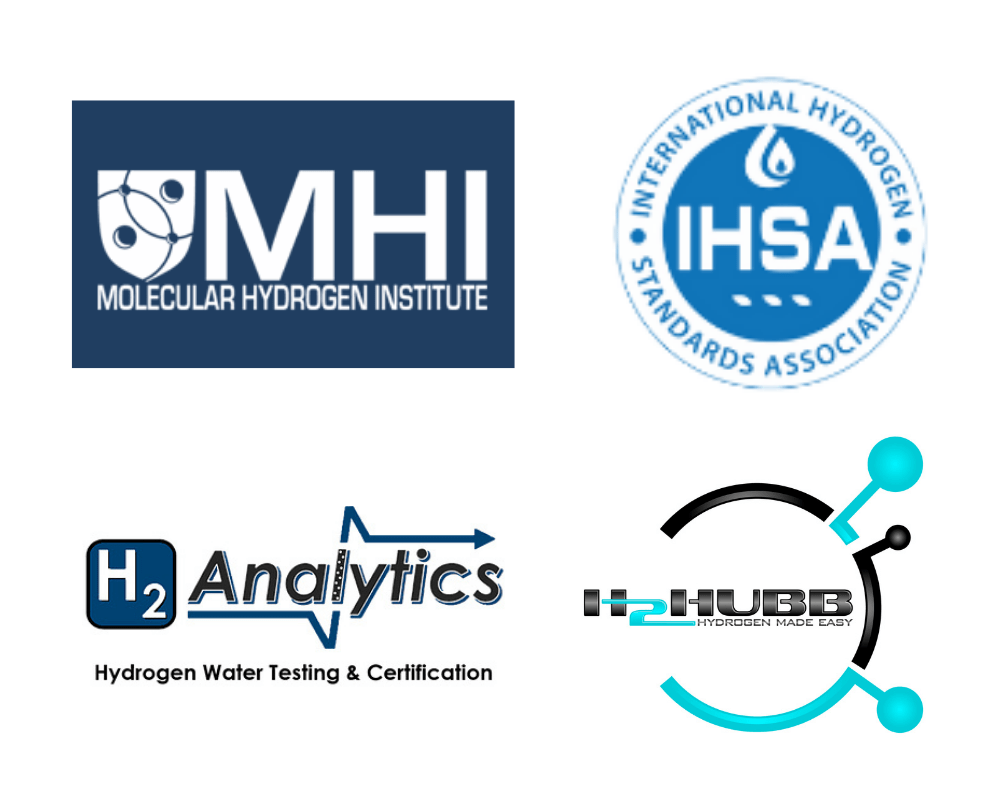Over the last 4 years, there has been a surge in online articles on therapeutic molecular hydrogen, particularly hydrogen water. If you search right now for “hydrogen water” in a google search you will see a countless number of articles on hydrogen water from companies or online sources who hold a tremendously high domain authority. This includes online sources such as TIME.com, SELF.com, HEALTHLINE.com, etc.
Unfortunately, many of these articles contain fallacies or misinterpretations about hydrogen water or the biomedical research conducted on it, revealing the rudimentary level of journalism several of these articles have employed when formulating these articles.
What’s worse is that, of the 20 thousand people that search for hydrogen water per month in the US via Google, these articles, not the research, not the opinion of the scientists or medical professionals that work in this exact niche or field of research, not even the online articles written by world experts, form their first impression [1].
These online sources have such high domain authority that it’s nearly impossible for the sources I mentioned to make it onto the first page of Google, which is unfortunate, considering there are estimations that more than 90% of people will not make it past the first page of their Google search.
So, in this series of posts, I will cover the top hydrogen water articles online and address the most overt fallacies or misunderstandings featured in these articles. My hope is that I can correct at least a fraction of the false or misleading information that is being perpetuated, and help as many people as possible come away with an accurate representation of what hydrogen water is and the medical research that has been and is being conducted on it.
Before we begin, I will fill you in on who I am and my experience in the therapeutic hydrogen industry. My name is Tywon Hubbard, the CEO of H2Hubb LLC, and the creator of the YouTube channel H2Minutes.
I have been involved in the hydrogen industry on many different levels for over 6 years now. These levels include sales, corporate, ownership, third-party, product development and analysis, and education. I have been mentored by some of the industry’s top researchers, educators, and engineers in this field of study. I was the first in the world to receive the MHI (Molecular Hydrogen Institute) Level 3 Professional Certification.
Though H2HUBB and H2Minutes, I seek to educate as many people as possible about the therapeutic potential of molecular hydrogen and its associated sciences in a simple manner. Several of my articles on molecular hydrogen for medicinal use have been featured on a prominent non-profit cancer site and I have had the privilege to have been quoted in a successful magazine regarding hydrogen gas therapy. My goal is to truly serve the industry at every level: customers, companies, and manufacturers.
Now, with all that being said, my work is not that of a scientist, researcher, or medical doctor. I am an independent educator of scientific and medicinal research dedicated to helping, serving, and educating the world about molecular hydrogen’s potential therapeutic benefits. A world authority and researcher of molecular hydrogen’s potential medical effects, such as Tyler LeBaron, founder of the Molecular Hydrogen Institute would be a better candidate for these rebuttals. Nevertheless, I do believe my experience in the therapeutic hydrogen industry as an educator on the biomedical research does allow me to speak to these issues and I will do my best to provide accurate rebuttals to these statements.
The first article I will be covering is from TIME.com. It is titled “Is Hydrogen Water Actually Good For You?”, which may impose a negative bias in the mind of the readers before they even begin to review the research data. In each of these articles, I will grab 3~5 misinterpretations, fallacies, or quotations and expound on them.
Let's Begin

TIME Article Quote:
“Some of these companies claim that adding more hydrogen to water increases energy, improves recovery after a workout, and reduces inflammation, making regular water look like a downright underachiever.
But the science behind those claims is weak, backed only by a few encouraging studies in rats and mice and even fewer—and smaller—trials in people.”
H2Hubb Rebuttal:
I will agree, health claims made by most of these hydrogen water companies are outlandish and go well beyond what the research suggests. Nonetheless, I disagree, with the statement “backed only by a few encouraging studies”. Currently, there are more than 2000 scientific studies and publications worldwide on the medical effects of molecular hydrogen in over 170 human disease models, with no cytotoxic effects[2], as well as more than 170 preclinical and clinical human trials with many more underway [3][4][5]. Through these studies, it can be concluded that molecular hydrogen in its various administration methods (hydrogen water, hydrogen inhalation, etc.) has therapeutic potential for virtually every organ in the human body[6]. Do we need more well-controlled randomized trials on molecular hydrogen’s medicinal effects? Of course, but the preliminary data is impressive and definitely suggests therapeutic potential. Furthermore, molecular hydrogen’s safety profile for humans is exceptionally high [7], meaning hydrogen water is safe to try as the research for its clinical use continues to progress. Thus, I wouldn’t call the science “weak”. The data suggests hydrogen therapy (hydrogen water, hydrogen inhalation, etc) is promising and warrants further large-scale investigation, which is taking place as I write this.
For instance, recent clinical studies have demonstrated that hydrogen inhalation appears to improved the disease severity and dyspnea of Covid-19 patients and are suggesting hydrogen inhalation as a new novel therapy for this current global pandemic.[8][9][10]
Also, the Japanese Ministry of Health Labour and Welfare (equivalent to our FDA, but with higher regulations and standards) has already approved H2 inhalation as a certified advanced medicine/medical treatment for PCAS (post-cardiac arrest syndrome) and is being implemented in hospitals to perform a huge human clinical trial. [11][12]
This level of clinical relevance and application has started taking place in the US as well. A research group from Harvard and Boston Children’s Hospital was funded by The American Heart Association and The Children’s Heart Foundation to conduct a cardiological study using H2 inhalation, and has filed with the FDA to classify hydrogen gas as a NID (new investigative drug). The success of the study has led to the research group now planning on conducting a Phase II clinical trial with several other U.S. medical centers.[13]
Molecular hydrogen holds promise for every one of the specific effects mentioned in this quote. Once again, in my opinion, the term “weak” is not an accurate way to convey this information and implies that hydrogen water may hold no therapeutic potential for humans, which is a false statement.
You can also visit our benefits page to learn more about the mechanisms that may be responsible for these effects. Here are a few quotes to substantiate my point.
“The anti-inflammatory effect of H2 has already been reported in many studies.”[14]
“H2 has exhibited anti-inflammatory activities in various injury models. Typically, H2 inhibits oxidative stress-induced inflammatory tissue injury via downregulation of pro-inflammatory and inflammatory cytokines, such as interleukin (IL)-1β, IL-6, tumor necrosis factor-α(TNF-α) [25, 26], intercellular cell adhesion molecule-1 [27], high-mobility group box 1(HMGB-1) [27], nuclear factor kappa B (NF-κB) [28], and prostaglandin E2 [29].”[15]
“In conclusion, this work presents, to our knowledge, the first double-blind placebo-controlled comprehensive study investigating the effects of H2-water in healthy adults. 1.5 L of H2-water intake for 4 weeks reduced cell death and inflammatory responses by modulating transcriptional networks of TLR-NFκB signaling. In addition, it may promote biological antioxidant capacity for adults > 30 yrs more than younger individuals.”[16]
“Finally, we found that mHW preserved or increased ATP levels and propose a new mechanism for mHW, that of ATP production through the Jagendorf reaction.”[17]
“Hydrogen treatment was also associated with increased graft ATP levels and increased activity of the enzymes in mitochondrial respiratory chain.” [18]
“However, these studies suggest that HRW may prevent early fatigue and reduce lactate levels [25,26], improve range of motion and recovery from soft tissue injury [27], attenuate delayed onset muscle soreness from eccentric exercise [28], prevent exercise-induced decline in antioxidant enzymes [28], and improve the ability to maintain peak power output during repetitive sprints [29].”[19]
TIME Article Quote:
“Animal studies and the few human studies that have been conducted, mostly in Japan, suggest that it may work as an antioxidant and to reduce inflammation. Oxidative stress from the sun, normal body processes, and exposure to pollutants can damage cells and lead to premature aging and diseases like cancer. Inflammation also contributes to many chronic conditions, from type 2 diabetes to heart problems and brain disorders. Hydrogen appears to reduce both. That means, at least in theory, that hydrogen water could help to reduce everything from diabetes to hardening of the heart vessels to Alzheimer’s and cancer. The studies to prove whether that’s the case, however, haven’t been conducted.”
H2Hubb Rebuttal:
The following is a statement from Tyler LeBaron. This quote is taken from an article he co-wrote with Dr. Mark Rosenberg (A medical doctor who specializes in cancer therapy) about molecular hydrogen’s medical effects. I encourage reading the whole article because Mr. LeBaron explains molecular hydrogen’s potential therapeutic effects in more depth.
“What are some of the key benefits to molecular hydrogen?
Hydrogen has now been demonstrated to have therapeutic effects in over 170 different human and animal disease models, and in essentially every organ of the human body [5]. The main reason for this is because H2 helps attenuate excessive oxidative stress and inflammation, both of which are at the root of virtually every disease and pathology [1, 2].”[20]
I would add we do need more research to make a definitive statement about hydrogen and its effects for every disease model mentioned in this quote and I am sure Mr. LeBaron would agree. In spite of this fact, we have data in humans and animal models that suggest therapeutic potential or promise for diabetes, hardening of the heart vessels, and Alzheimer’s. Here is a quote or two about each.
“Hydrogen is a common non-toxic and safe medical gas, and its beneficial effects on AD (Alzheimer’s Disease) have been confirmed in many studies, mainly through anti-inflammatory, anti-oxidative stress, anti-apoptotic, and the regulation of both autophagy and hormone signaling pathway. Small-scale clinical studies have begun on the role of hydrogen in AD, so hydrogen is a new type of medical gas with great development prospects and we expect larger-scale clinical studies to be implemented.” [21]
A series of studies from the Qin Shucun group indicated that the anti-atherosclerotic effect of H2 is achieved by suppressing NF-κB activation and subsequently blocking cytokine-induced lectin-like oxidized LDL receptor-1 (LOX-1) gene expression in ECs [23]; decreasing plasma LDL cholesterol and apolipoprotein B100 and apo B48 levels in LDL, and improving HDL functions, including the capacity to enhance cellular cholesterol efflux and anti-oxidative properties [24–26].[22]
“Hydrogen-rich water intake was also associated with a trend of decreased serum concentrations of oxidized LDL and free fatty acids, and increased plasma levels of adiponectin and extracellular-superoxide dismutase. In 4 of 6 patients with IGT, intake of hydrogen-rich water normalized the oral glucose tolerance test. In conclusion, these results suggest that supplementation with hydrogen-rich water may have a beneficial role in prevention of T2DM and insulin resistance.”[23]
Apart from scientific quotations, such as the ones above or explanations of where the research of molecular hydrogen actually lies currently, statements such as the ones mentioned in the Time Article will leave people with a false impression about this topic. In my opinion, articles such as these must do a better job investigating these topics and the research before writing the article.
TIME Article Quote:
“For one, it’s not clear how much hydrogen is needed to have therapeutic benefits and how much water you’d have to drink to reap the potential rewards. ‘We don’t know anything about dosing or the frequency you need to drink hydrogen water to get health benefits,’ says Robin Foroutan, a dietitian and spokesperson for the Academy of Nutrition and Dietetics. The amounts of hydrogen in the various products currently on the shelves vary widely, and there is no regulation to standardize formulas—mainly because there isn’t a solid scientific base to determine how much is needed to affect various conditions.”
H2Hubb Rebuttal:
It is true that the administration dose for molecular hydrogen via water is still under investigation. Researchers or experts in the field have yet to come to an official consensus (release a official statement) about a specified dosage level (milligrams) of molecular hydrogen for each disease model but there is an agreement that the research is suggesting 1~3 mg/day of H2 is what is seen throughout the literature to produce therapeutic effects in humans, with 0.5 mg/day appearing to be more of a minimum threshold. Furthermore, preclinical and clinical humans studies are administering 1~15 mg of H2 per day, and are seeing statistical improvements in various disease models.[24][25][26][27][28][29]
“That is the same question scientists are asking and is still under investigation. However, the animal and human studies generally provide about 0.5 to 1.6 mg or more of H2 per day, and these doses show statistically significant benefits. So, if your water has a concentration of 1 mg/L (equivalent to 1 ppm, parts per million), then two liters will give you 2 mg of H2. Although the effective concentration for some people and some diseases may be lower and/or higher, these doses are simply what have been seen to exert benefits. (see this article also).”[30]

Secondly, there is a scientific organization that is setting minimum standards for hydrogen water products in relation to the literature. The organization is called the IHSA (International Hydrogen Standards Association). The organization was established in 2016 and hydrogen product manufacturers have already begun the process of being tested and certified to IHSA standards through the only IHSA-approved lab in North America, Las Vegas-based H2 Analytics. Hydrogen water products certified to IHSA’s minimum standards can provide 0.5 mg or more of dissolved hydrogen gas in water, which has been demonstrated to produce therapeutic effects in human studies.[31]
Thirdly, our company, H2HUBB, which is independent and does not directly sell any hydrogen products, tests and recommends hydrogen products to the public that coincides with the scientific literature. We at H2HUBB have formed objective performance standards based on the research and we test hydrogen products against these standards and recommend the ones that meet those standards. Thus, we do the hard work to identify which hydrogen products hold therapeutic potential and which ones do not. It’s our hope that as the research and industry grow we can help those who want to engage in it and help them to reap the benefits of molecular hydrogen.
Due to the lack of visibility, people are unaware of these four companies or organizations, MHI, IHSA, H2 Analytics, and H2HUBB and how they are working in this space to provide answers. One last word of contention is that TIME could have interviewed a person such as Tyler LeBaron, and they could have received a more well-rounded perspective. I’m sure Robin Foroutan is knowledgeable in her field of study but hydrogen therapy does not appear to be her wheelhouse and surely not as much as Tyler LeBaron.
So based on human studies, the suggested dose people should aim for is 1~15 mg of H2 per day. If you want to learn how to calculate the amount you need to drink, check out our calculator page that makes this process super easy for you.
TIME Article Quote:
“Perricone says that the packaging for the water is also important, since hydrogen tends to dissipate very quickly and can diffuse through plastic and glass. Any products in these containers won’t likely have much added hydrogen in them, he says. (Perricone says he sells his water packed in a special aluminum coated with a proprietary compound to maintain hydrogen’s efficacy.)”
H2Hubb Rebuttal:
Dr. Perricone is correct, hydrogen products need to be tested for hydrogen concentration and consumers should do their best to verify that the product contains a therapeutic amount of hydrogen gas dissolved into the water. You can use this simple tool to do so and can use H2HUBB as a resource to know as we have tested over 50 hydrogen products on the market and analyze many of them annually.
This article is the first of hopefully many, as there are many popular articles to debunk. I hope it provided clarity to a confusing topic and helped you understand a little more about molecular hydrogen and how it can be so misunderstood.
